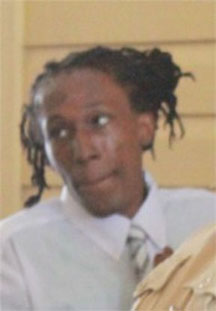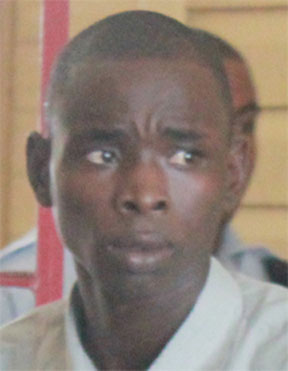The Court of Appeal has ordered that Mark Royden Williams and James Anthony Hyles be retried for the murders of the 11 persons killed in the 2008 Lusignan massacre.
In making the decision, the Appeal Court found that there were some irregularities at the trial and the cumulative effect rendered the not guilty verdicts in their favour unsafe and unsatisfactory.
The ruling was delivered at a hearing yesterday morning by acting Chief Justice Yonette Cummings-Edwards, who presided over the proceedings along with acting Chancellor of the Judiciary Justice Carl Singh and Justice of Appeal B.S. Roy.
In August, 2013, Hyles called, ‘Sally,’ and Williams, called ‘Smallie,’ were found not guilty on each of the 11 counts of murder for which they were being tried in the High Court.
The Director of Public Prosecutions (DPP) subsequently appealed the verdicts.

The two were accused of killing 48-year-old Clarence Thomas, his 12-year-old daughter Vanessa Thomas and his son Ron Thomas; 32-year-old Mohandai Gourdat and her two sons, four-year-old Seegobind Harrilall and 10-year-old Seegopaul Harrilall; 22-year-old Shazam Mohamed; 55-yearold Shaleem Baksh; Seecharran Rooplall, 56, his wife Dhanrajie Ramsingh, 52 and their 11-year-old daughter Raywattie Ramsingh, on January 26, 2008, at Track ‘A’ Lusignan. Gunmen had stormed their homes in the wee hours of the morning and began shooting.
Among the grounds for the appeal was the nondisclosure to the judge by the jury foreman and attorney Nigel Hughes, who represented Hyles, that the foreman, Vernon Griffith, was a former client of the lawyer.
After the trial, trial judge Navindra Singh had placed a life ban from jury service on Griffith for his non-disclosure.
The DPP had maintained, after conveying its intention to appeal, that Hughes needed to disclose that he had represented Griffith in a civil case for a period of six years starting in 2002. This non-disclosure, the DPP argued, constituted a “material irregularity.”
The DPP contended that the non-disclosure was “material and significant given the fact that at the commencement of the trial on the 15 July, 2013, before the jury was selected and empanelled, the learned trial judge specifically called out the names of all the attorneys involved in the case and told the entire panel that if they know or are associated with any of the attorneys, they ought to so indicate and would be excused.”
Hughes and Griffith remained silent, it was noted.
Delivering the ruling from the bench and with which the other justices concurred, Justice Cummings-Edwards noted that the court found that the foreman had an ethical and legal duty to disclose his relationship with Hughes.

The judge suggested that by the foreman not doing so, his neutral role as a juror was compromised. In the same manner, the court found that Hughes also had an ethical duty to make this disclosure without affecting the lawyer-client relationship.
The acting Chancellor, meanwhile, asserted that this was a serious error of judgement by Hughes when he failed to disclose he knew the foreman.
The DPP also contended that the trial judge erred in not holding an inquiry when it was brought to his attention by Prosecutor Judith Gildharie-Mursalin that a juror was seen showing the ‘thumbs-up’ sign to Hyles’ father.
The Appeal Court ruled that the trial judge ought to have held an inquiry into state counsel’s complaint that a juror was seen showing the ‘thumbs-up’ sign. The court noted that after such a complaint, it was the paramount duty of the trial judge to hold an inquiry to determine what the juror’s actions meant.
Another of the grounds for appeal cited by the DPP was that Justice Singh erred in allowing the questioning of jurors by the defence before they were sworn in.
Justice Cummings-Edwards said that there is no common law or statutory provision in Guyana which allows for the questioning of jurors by the defence before they (the jurors) are sworn.
Resultantly, the court found that the trial judge erred in law by allowing this questioning to be done.
The acting Chief Justice further noted that the process of jury selection is based on the principle of “random selection,” and added that the court found that the questioning of the jurors interfered with the random-selection principle.
Weighing in on this issue, the acting Chancellor said that this practice was clearly wrong, inappropriate and contrary to random selection.
The DPP had also contended that the judge erred in permitting the cross-examination of police witnesses by the defence in relation to alleged impropriety by the police, without warning them that they would have to substantiate it.
The DPP also argued that the judge erred when he excluded 76 photographs depicting the crime scene and the victims that the prosecution sought to enter as evidence on the basis that they would evoke emotional responses in the jury.
The issue of the judge’s direction regarding the legal principle of joint enterprise was also cited as one of the grounds for appeal as was the contention that the trial judge erred in directing the jurors that they can determine whether the caution statement of the accused was freely and voluntarily made.
Justice Cummings-Edwards noted that the jury was not adequately directed by the trial judge on the issue of joint enterprise, while she added that the issue of whether the caution statement of the accused was given voluntarily was not one for the jury.
DPP Shalimar Ali-Hack was in attendance at yesterday’s hearing.
At the conclusion of the High Court trial, Hyles was set bail in the sum of $1.1M. Williams, who has had other pending matters against him, remained in custody.




